| کد مقاله | کد نشریه | سال انتشار | مقاله انگلیسی | نسخه تمام متن |
|---|---|---|---|---|
| 5073611 | 1477123 | 2015 | 12 صفحه PDF | دانلود رایگان |
- Sees legitimacy as produced through contested practices and techniques of governance.
- Suggests how lack of recognition does not preclude political legitimacy.
- Conceptualises liminality as a creative space for producing legitimacy.
- Explores 'geographies of legitimacy' as different from geographies of legality.
- Compares extra-territorial and trans-national governance for Western Sahara and Tibet.
While scholars agree that political legitimacy, or the legitimacy to rule, is sought by governing authorities, the concept itself is often considered to be problematically vague. This article explores how the very ambiguity of the concept of legitimacy may make it 'good to think with'. Calling into question two problematic assumptions in discussions of legitimacy-whether legitimacy is the prerogative of state authorities, and whether legality is a necessary basis from which to make claims for legitimacy-this article uses the cases of two exiled governing authorities, for Western Sahara and Tibet, to examine how legitimate government can be produced in the absence of full legality as a recognised sovereign state. Attending to similarities and differences between these governments-in-exile we trace the sources of political legitimacy in each case and the techniques through which legitimacy is constructed in exile. Key to this has been the enactment of forms of rational-legal authority, including the establishment of state-like bureaucracies, the provision of services to their diasporic populations and aspirations to develop democratic structures. With the latter presented as a strategy both of securing internal legitimacy and of being seen to adhere to international norms of 'good governance', legitimacy in these cases emerges not so much as an achieved status, but as a set of techniques of government. We conclude by reflecting on how liminality - both territorially in terms of displacement and legally in terms of lack of full recognition - can counter-intuitively provide creative grounds for producing legitimacy.
Journal: Geoforum - Volume 66, November 2015, Pages 203-214
